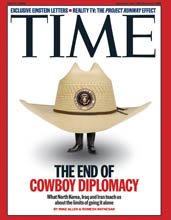Time: “The End Of Cowboy Diplomacy”...
 Time MIKE ALLEN AND ROMESH RATNESAR July 9, 2006 at 09:12 AM
Time MIKE ALLEN AND ROMESH RATNESAR July 9, 2006 at 09:12 AMREAD MORE: George W. Bush
In the span of four years, the Bush Administration has been forced to rethink the pre-emptive "Bush doctrine" with which it hoped to remake the world as the strategy's ineffectiveness is exposed by the very policies it prescribed, TIME's Mike Allen and Romesh Ratnesar report in this weeks cover story on 'The End of Cowboy Diplomacy' on newsstands Monday, July 9th.
President George W. Bush came to office pledging to focus on domestic issues and pursue a "humble" foreign policy that would avoid the entanglements of the Bill Clinton years. After Sept. 11, however, the Bush team embarked on a different path, outlining a muscular, idealistic, and unilateralist vision of American power and how to use it, TIME reports. They aimed to lay the foundation for a grand strategy to fight Islamic terrorists and rogue states, by spreading democracy around the world and pre-empting gathering threats before they materialize. And the U.S. wasn't willing to wait for others to help. The approach fit with Bush's personal style, his self-professed proclivity to dispense with the nuances of geopolitics and go with his gut. "The Bush Doctrine is actually being defined by action, as opposed to by words," Bush told Tom Brokaw aboard Air Force One in 2003.
The swaggering Commander in Chief who embodied the doctrine's aspirations has modulated himself too. At a press conference with British Prime Minister Tony Blair in May, Bush swore off the Wild West rhetoric of getting enemies "dead or alive," conceding, "in certain parts of the world, it was misinterpreted." Bush's response to the North Korean missile test was equally revealing. Under the old Bush Doctrine, defiance by a dictator like Kim Jong Il would have merited threats of punitive U.S. action-or at least a tongue lashing. Instead, the Administration has mainly been talking up multilateralism and downplaying Pyongyang's provocation. As much as anything, it's confirmation of what Princeton political scientist Gary J. Bass calls "doctrinal flameout." Put another way: cowboy diplomacy, RIP.
Read the whole story here.




0 Comments:
Post a Comment
<< Home